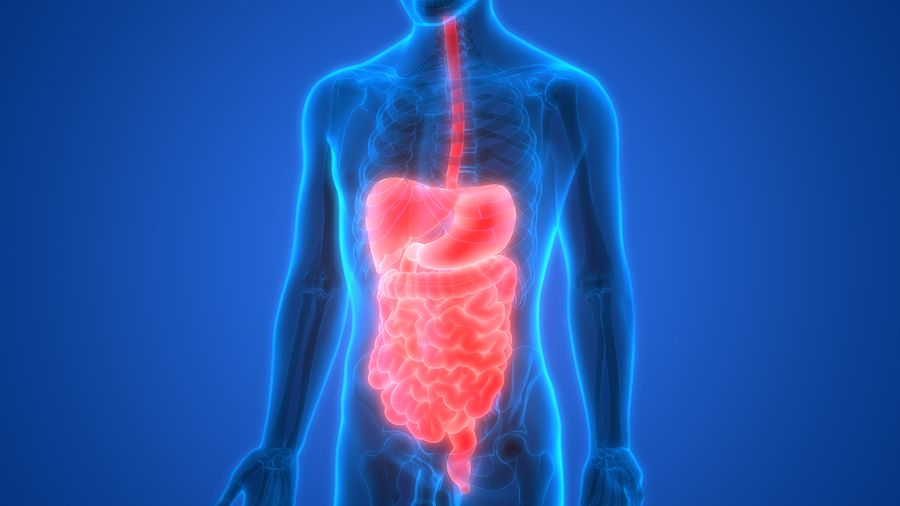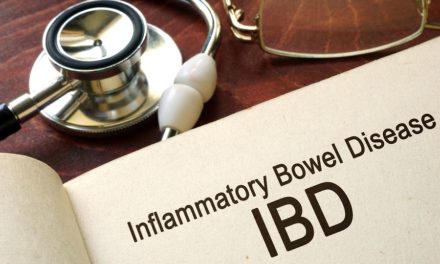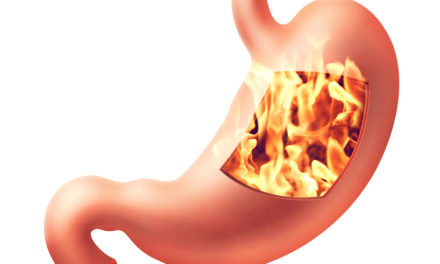This report is written for people who had high scores on the Digestion portion of our Health Questionnaire. Obviously a simple health questionnaire cannot diagnose disease. This material is put together for educational purposes and is not meant to diagnose or treat any disease.
Many natural health practitioners believe that problems in the digestive system are the beginning of many other health problems like asthma, allergies, arthritis, and even autoimmune disease. Most of your immune system is associated with the intestine—to protect from the bacteria that grow in the large intestine. Whether or not you believe that, the digestive is still very important. It is a 25 foot tube that begins in the mouth and ends at the anus. Technically food in the GI tract is still outside of the body until it is absorbed.
High scores in this category mean that digestion is less than ideal. Symptoms like gas and bloating are the result of incomplete digestion. The questionnaire will not specifically diagnose your digestive problem, just identify that this is an area that needs attention.
It is vital that you correct any problems with your digestive system. Even if the symptoms are not severe and you can live with them, it is important to correct the underlying digestive problem because it can be at the root of much more serious health problems later on.
Poor digestion can be a source of fatigue. Poor digestion often means that necessary nutrients are not absorbed. Also, if food is not properly digested, it literally rots—being broken down by bacteria in the intestine. The poorly digested food causes overgrowth of bacteria that do not belong in the intestine, and the production of toxins—very fatiguing.
Digestion begins in the mouth with chewing to break down the food into smaller pieces. Thorough chewing makes food easier to digest. Many people suffering from gastric reflux would do much better if they thoroughly chewed their food. Chewing also mixes the food with saliva, which has amylase, an enzyme that helps to digest carbohydrates.
Next the food goes to the stomach where it is mixed with hydrochloric acid and pepsin. Hydrochloric acid is produced by the stomach. It activates enzymes that digest protein and is necessary for the digestion and assimilation of minerals and other nutrients. The stomach adds hydrochloric acid and pepsin to help digest the food. The food then moves to the first part of the small intestine, or duodenum. There the pancreas adds enzymes to digest protein, fat and carbohydrate and the gall bladder secretes bile to help emulsify fats.
Problems with digestion in the stomach and duodenum include inadequate production of hydrochloric acid (also called “hypochlorhydra”), pancreatic enzymes and bile salts. If this initial phase of digestion is inadequate, nutrients will not be absorbed, the GI tract can become irritated and yeast and other improper flora can grow in the lower bowel.
Poor digestion can be the beginning of digestive problems, fatigue, nutrient deficiency, obesity, food cravings and allergies. It can also be the cause of irritable bowel, colitis and Crohn’s disease. Hypochlorhydra, or inadequate production of stomach hydrochloric acid is not recognized by traditional medicine. Traditional medicine believes that you can get along fine without any hydrochloric acid. Some holistic practitioners believe that hypochlorhydra can cause GI symptoms. Patients who are hypochlorhydric tend to have gas and become bloated after eating. They believe that it can also be at the root of many chronic health problems. People who do not produce enough hydrochloric acid tend to be deficient in amino acids, minerals and vitamin B12.
It is controversial, but some holistic practitioners believe that people who do not produce enough hydrochloric acid (HCl) tend to bloat after meals, have gas and, oddly enough, may have gastric reflux. Often people who are hypchlorhydric get nauseous when they take vitamin supplements. Hypochlorhydra sets the stage for more serious problems like dysbiosis (growth of yeast, parasites or the wrong bacteria in the GI tract), allergies, poor absorption of nutrients (which can lead to fatigue, depression, joint pain and many other health problems), and more problems throughout the GI tract. The most interesting of these symptoms is gastric reflux, or GERD. Medical treatments for acid reflux center around suppressing acid production. But some think that there isn’t too much acid, in most cases, there isn’t enough. Inadequate HCl production leads to incomplete digestion and gas, forcing the acid that is present into the esophagus. The acid burning of gastric reflux isn’t from too much acid, it usually is from too little acid and that acid just ends up in the wrong place. Some animal studies show that reflux may actually be gastritis caused by bacteria; the body increases acid production to keep the bacteria in check and certain antacids can actually aggravate the problem by allowing the bacteria to proliferate.
In order for the stomach to make HCl you need adequate zinc and vitamin B1. If you are eating a diet high in refined and processed foods, these nutrients will be in short supply; such a diet may cause hypochlorhydra. Some authors believe that breast feeding is necessary for the development of parietal (acid-producing) cells in the stomach and that people who have not been breast-fed may have a tendency to have hypochlorhydra.
The small intestine is approximately 20 feet long. Its irregular surface, full of projections called villi and microvilli give it a surface area approximately the size of four tennis courts. The cells of the small intestine secrete enzymes to break down food and they absorb nutrients. Problems with the small intestine can lead to poor nutrient absorption; you don’t get the nutrients even if you are eating properly. This can lead to fatigue, allergies, digestive problems and many other chronic health problems.
The large intestine, or colon, is the final five feet of the digestive tract. In it there should be between five and seven pounds of bacteria. The number of bacterial cells in your body is greater than the total number of cells making up your body.
Normal bowel flora (bacteria in the colon) is necessary for good health. Colon bacteria produce butyric acid, which nourishes the colon cells. If the levels of butyric acid are too low, there is an increased risk in colon cancer.
Constipation is also a concern. It can burden the immune system, create fatigue and increase the chance for colon cancer. Even if you have a bowel movement every day, constipation can still be an issue. The two main things to consider with constipation are whether or not there is adequate fiber and water in the diet. One common occurrence is the patient who takes psyllium seed or other fiber source and is still very constipated; in fact it seems as if the fiber supplement is making him or her more constipated. Most of the time this is due to not getting enough water.Bowel transit time is very important. What you ate yesterday should be departing today (within 24 hours). Some people, although they have daily bowel movements, can have a bowel transit time that lasts two or three days. That is not a healthy situation.
There are between four and seven pounds of bacteria in the colon. They belong there. Think of the GI tract as an ecosystem, with a balance between beneficial and not-so-beneficial microorganisms. Beneficial bacteria do the following:
- Produce vitamins like folic acid and B12.
- Nourish the lining of the colon by producing butyric acid. They do this by feeding on vegetable fiber. Adequate butyric acid levels reduce the chances for colon cancer.
- Inhibit harmful bacteria.
- Break down toxins.
Dietary / Lifestyle Guidelines:
- Avoid refined sugar and white flour products: These are nutrient-depleted foods that do not provide zinc and B1 necessary for HCl production. Also, eating them is stressful to your digestion.
- Eat slowly, chew your food thoroughly: Food broken down to tiny particles by chewing is much easier to digest than large chunks of food. Also, your saliva has amylase, an enzyme that breaks down starch.
- Do not eat starch and protein together: Starch/protein combinations are difficult to digest. Meat and potatoes, sandwiches made with bread and meat, chicken and rice, and all the combinations we love are, unfortunately, difficult to digest.
- Eat plenty of fresh, raw produce: Fresh vegetables contain enzymes, which aid digestion. We tend to eat too many cooked foods (in the wrong combinations—see the point above), making our digestive systems work much harder than they have to.
- Drink a warm liquid or have a small appetizer before meals: This will prepare your digestive system and it will begin to secrete hydrochloric acid and enzymes.






